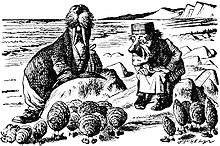|
The Walrus and the Carpenter
 "The Walrus and the Carpenter" is a narrative poem by Lewis Carroll that appears in his book Through the Looking-Glass, published in December 1871. The poem is recited in chapter four, by Tweedledum and Tweedledee to Alice. Summary
The poem tells the story of a walrus and a carpenter who meet on a beach and decide to go for a walk. They come across a group of oysters, and the walrus persuades them to come with them. The oysters follow the walrus and the carpenter, and they are eventually all eaten. InterpretationsThe characters of the Walrus and the Carpenter have been interpreted many ways both in literary criticism and popular culture. British essayist J. B. Priestley argued that the figures were political.[2] Walter Russell Mead supposed they represent aspects of Protestant and Transcendentalist societies during Carroll's life.[3] The 1967 The Beatles song "I Am the Walrus", which is based on the poem, is also a common subject of nonsense inquiry.[4] John Lennon later inferred Carroll's views on capitalism from the poem, joking that perhaps he should have instead sung "I Am the Carpenter".[5] In the film Dogma, one of the characters claims that the poem is an indictment of organized religion.[6] Television adaptationA series of six episodes starring Hugh Griffith, Felix Aylmer, and Daphne Heard was made by the BBC in 1965. FilmThe Walrus and the Carpenter story appears in Disney's 1951 animated film Alice in Wonderland where it is told by Tweedledee and Tweedledum. In the 1999 version of Alice in Wonderland, the story appears near the end of the film, when Alice meets the twins. See alsoReferences
Further reading
External links
|